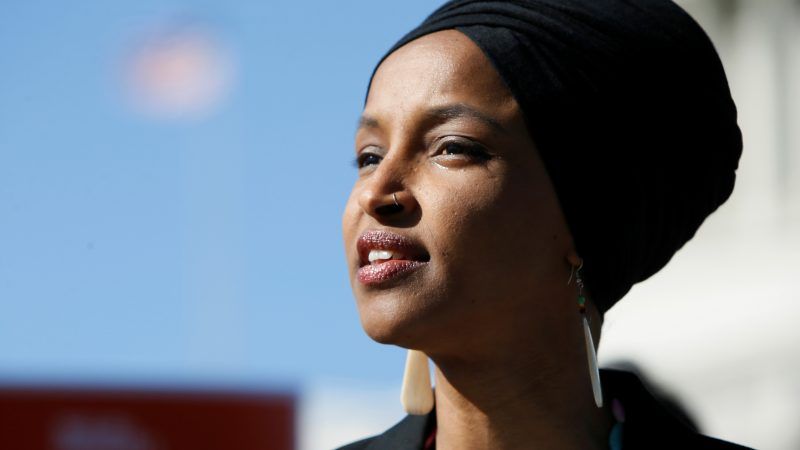The Ilhan Omar 'Some People Did Something' Controversy Is Bad-Faith Outrage-Mongering on All Sides
Anatomy of a nontroversy

A clip of Rep. Ilhan Omar (D–Minn.) describing the 9/11 terrorist attacks as an incident in which "some people did something" went viral on social media last week.
What followed was a vicious cycle of thunderous conservative indignation, complete with President Donald Trump tweeting a video mashing up Omar's remarks with footage the planes hitting the Twin Towers, followed by an overreaching liberal backlash against the backlash, in which Democratic presidential contenders Beto O'Rourke and Sen. Elizabeth Warren (D–Mass.), as well as Rep. Alexandria Ocasio-Cortez (D–NY), all accused Trump of inciting violence against Omar.
The plain truth is this: Omar's comments may sound flippant when taken out of context, but they were nowhere near as offensive as the right made them out to be—and Trump's tweet, though thoughtless and unfair, did not represent any kind of violent threat. Everybody who got worked up about Omar was stoking unfounded outrage. And they were doing it hypocritically, since this is the kind of thing each side tends to hate when the other side does it.
Here is the full context of Omar's remarks, delivered at a Council on American-Islamic Relations (CAIR) event last month:
Here's the truth. For far too long we have lived with the discomfort of being a second-class citizen. Frankly, I'm tired of it. And every single Muslim in this country should be tired of it. CAIR was founded after 9/11 because they recognized that some people did something and that all of us were starting to lose access to our civil liberties.
"Some people did something" is not the most sensitive way to describe 9/11, but the right—and the Trump tweet, specifically—made it sound like that was all she had said. She wasn't minimizing the tragedy; she was suggesting that what some Muslims did threatened all Muslim Americans' civil liberties. Omar was arguably incautious with her choice of words (and CAIR was actually founded in the 1990s), but those who dragged her for this were engaged in"patriotic correctness," a right-wing variety of political correctness.
Omar's remarks did not merit this level of denunciation. But as a sitting congresswoman, she's in the political fray; she should not be immune from criticism, wrongheaded though it sometimes may be. Some of that criticism crossed a clear line: Omar has claimed that she received death threats in the wake of Trump's tweet. No one should be threatened for expressing their opinions, and the government should take whatever action is necessary to make sure Omar is safe. But even if Trump calling attention to Omar's comment had the effect of causing her to receive death threats, Trump himself did not threaten or incite violence, in either a strictly legal or a metaphorical sense. It would be no more appropriate to accuse Trump of inciting violence against Omar than it would be to hold the far left at fault for the 2017 congressional baseball shooting, which was perpetrated by a Sanders supporter who had appropriated some views of the Republicans-are-the-real-Taliban variety.
In general, don't criticize a politician because some people might take it too far and threaten her would be a bad rule, one that would make it more difficult to hold politicians accountable when they really have earned a good lambasting.


Show Comments (262)